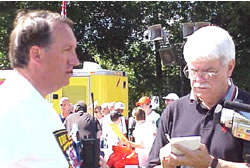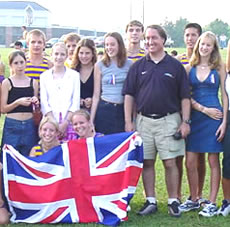|
by John Dye
CHARLOTTE NC 9/22/01 -- As the Great American Cross Country Festival
ends, Rick Hill looks tired. It could be post-partum depression
or it could be more serious.
 The
founder and director of the wildly popular meet (Left
in photo, talking to Dye at the 2000 Great American)
faces tough decisions in the months ahead. "I don't know if
there will be a fourth," Hill says, when asked for a status
report after the third year of Great American. The
founder and director of the wildly popular meet (Left
in photo, talking to Dye at the 2000 Great American)
faces tough decisions in the months ahead. "I don't know if
there will be a fourth," Hill says, when asked for a status
report after the third year of Great American.
This sounds shocking as you look around the festival scene at Winthrop
Farm Meadows, Rock Hill SC. Happy faces, great competition, entries
doubling every year, praise and thanks pouring in on Hill. It's
a great success -- isn't it?
Great American's innovations made it an instant hit with high schools
across America -- face to face competition of nationally ranked
teams, festive atmosphere featuring great balloon arches, professional
sound system with music, dinners and dances for the runners, substantial
funding for travel expenses.
But there are problems:
Cost -- Sponsorships and entry fees have covered only part
of the cost of running the meet. Hill has spent $200,000 of his
own money to make up the difference. "How long can I keep doing
this?" he asks. And still, it would cost much more money to
do it properly in his eyes.
Good is not enough -- Despite the appearance of big spending,
Rick Hill hasn't been able to afford much of the dream he had 3
years ago, such as jumbotron screens showing progress of the race
on the other side of the course, grandstand seating down the home
stretch, teams from around the world, scoreboards showing leaders
and team rankings throughout the race, and much more. Hill was a
successfull businessman by thinking big, and he applies the same
thinking to staging cross country meets.
Administration -- The meet has been run so far by family
and friends, and they are getting burned out. "We need professional,
year round administration," Hill says, "but that would
take another $100,000."
Personal -- A year ago, Hill sold his business to experiment
with full-time meet management. The experiment didn't get a fair
test because of a series of personal setbacks -- death of a brother-in-law,
surgery on ligaments, and a pulmonary embolism. "It would really
take 18 months to plan our meet properly, and we didn't even have
12 this time," Hill says. Regardless, Hill must now resume
his business career; at 49, he is too young to retire, and he still
has children to put through college.
A fifth problem affected this year's meet, but is hopefully not
a recurring issue. After the September 11 terrorist attacks shook
the nation, 40 percent of the Great American entries from beyond
the Southeast region decided not to travel to Charlotte.
The business decision confronting Hill is to cut costs or increase
revenues. Cutting costs is not acceptable in his eyes, because an
ordinary meet holds no interest to him. "I'm not going to dumb
it down to the mediocre level just to keep it going," Hill
says.
The next 3 months will decide the fate of the Great American. Hill
will make a concerted effort to obtain more sponsorship funding,
something he didn't do in the past year because of the personal
problems. Significant additional sponsorship revenue is needed for
the Great American Festival to continue.
Not continuing the Great American would be "a very emotional
decision" on Hill's part. "It has been an extremely interesting
learning experience." The high school cross country community
across the nation fervently hopes that Hill can keep learning for
years to come.
Here are the considerations which Hill wrote down for DyeStat:
1. I need some time to regenerate before making
a commitment for 2002. However, we need to push the buttons for
2002 in 60 days. I am not sure how I will feel about the event in
30 days or 60 days. The big issue I struggle with is the drain on
my family and our financial resources. We are all committed to making
Great American work at the highest level. However, it must stand
on it own two feet and must support professional management.
2. Great American is a large and complex event.
It takes large amounts of time and money to coordinate travel, sanctions,
insurance, security, web sites, public information, brand development,
entertainment, venue development, team registration and roster submissions.
3. Great American is at another crossroad. We have
a choice of eliminating levels of service, branding, marketing,
pageantry in order to handle the mass of teams, or we can cut back
the size of the festival in terms of number of competitors to maintain
an elite race or we can generate enough revenue to add all of the
services for anyone that wants to pay for them. Great American is
a $235,000 event and entry fees only cover around 20%.
4. I do not have an interest in being just another
big cross-country meet. The nation has a number of those and they
are done very well.
Having stated the above these are the certainties.
1. We will create much more difficult standards
for team and individual entry for subsequent years.
2. Elite individuals will not run in the race of
Champions. We will make it a team race only. Elite individuals make
it difficult to follow the team competition.
 3.
More International high school runners will be recruited to run
in a race with elite US high school individuals. At left,Hill
receives a flag from the British delegation to the 2001 Great American
Festival at Rock Hill SC. 3.
More International high school runners will be recruited to run
in a race with elite US high school individuals. At left,Hill
receives a flag from the British delegation to the 2001 Great American
Festival at Rock Hill SC.
4. Our travel assistance program will be changed.
Too many teams see us as a free trip to Disney World.
5. The meet requires many professional service companies
to handle certain aspects of the management, registration, accounting,
retail sales, setup and take down. Likewise we need to build a team
of big time meet managers to handle the start, finish, chutes, awards,
etc.
6. The meet requires more than one host school.
7. Make major changes for crowd control, team check-in
and package pickup.
If we go forward my wish lists is as follows:
1. Add a second collegiate race for men and women
to be for elite/top 20 teams. We want to have not less than 6 elite
collegiate teams run in this top race.
2. Add an elite race with no less than 5 of the
top 20 runners in the world for both a men's race and women's race.
3. Add an adult club race.
4. Recruit several youth club teams to run in the
middle school race.
5. Add stadium seating for 1000 people at the finish
line and show portions of the race via a Sony Jumbotron.
6. Get our lights back from the military bases to
conduct up to 6 races under the lights.
7. Add a finish line hospital to handle many more
runners quickly.
8. Add a very large tent to the finish line area
to house awards, media center, retail, sponsor lounge, food court
and dinner/dance/concert. This type of a tent would have HVAC, restrooms,
electricity, hardwood floor and would allow us to operate in any
weather condition.
9. Build an elevated press box to manage race announcements,
sound system, DJ, entertainment, scoring, timing, and results from
one location.
10. Build an entertainment stage.
11. Make major improvements to the sound system.
12. Hire an entertainment director and add more
music, bands and singers.
13. Develop the look of the race with enhancements
to the crowd control barricades, starting line, awards stage, mile
markers, starting boxes, public entrances and the big tent.
Return to Great American home page
| 


